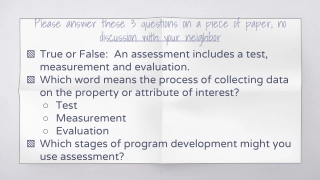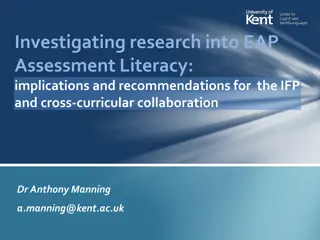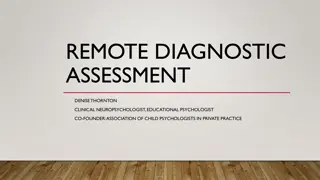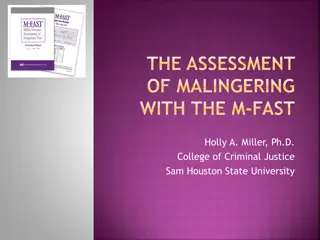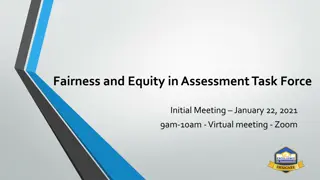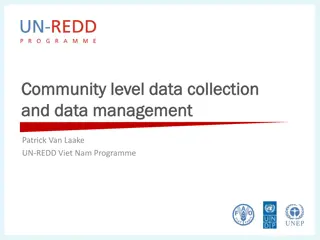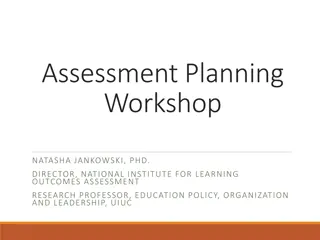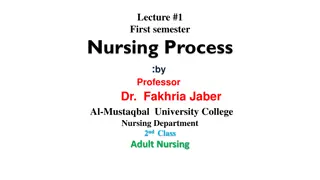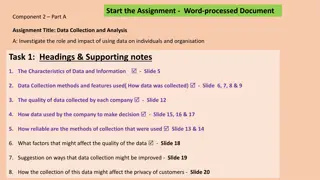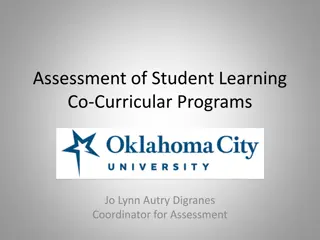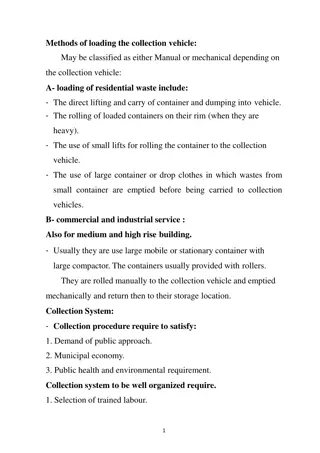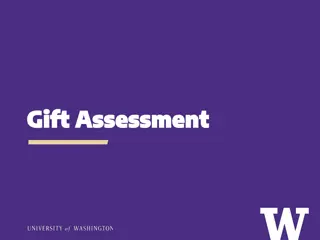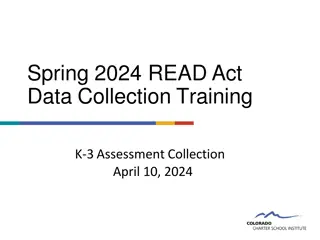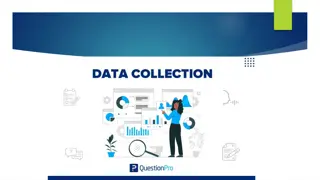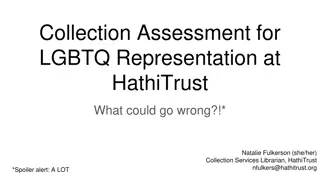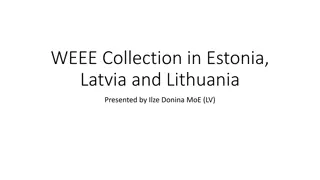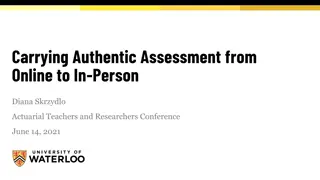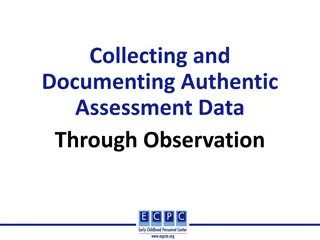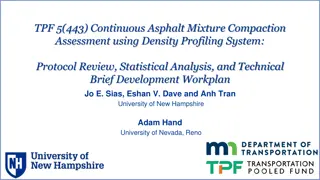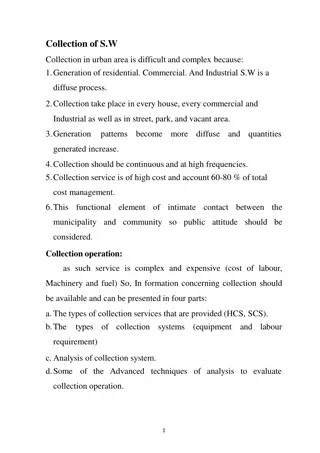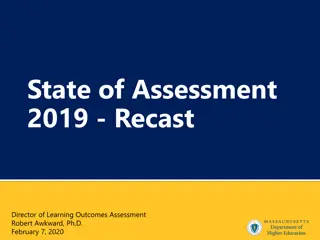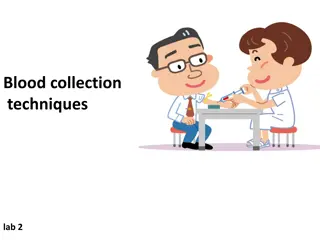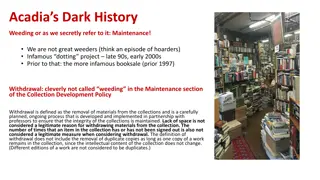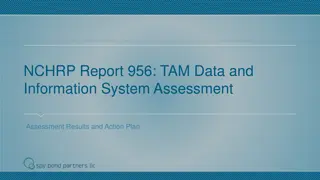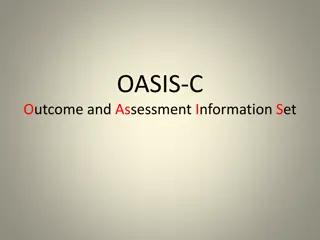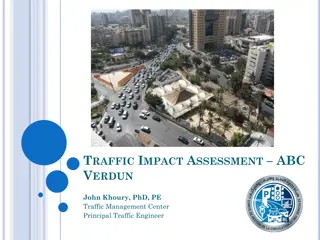Unlocking Assessment: The Value of Data Collection in Programming
Discover the significance of assessment in program development, understand its role in planning, and explore various assessment methods. Lei Dunn shares insights on leveraging assessment for academic excellence and program success.
0 views • 47 slides
Sheffield Early Help Assessment Form Update and Integration with Extended Support Plan
Sheffield has introduced an updated Early Help Assessment form to streamline the assessment process within the Early Help System. This new form combines the Early Help Assessment with the Extended Support Plan, aligning various assessment tools and referral forms into one comprehensive document. The
5 views • 22 slides
Enhancing Language Learning Through Peer Assessment
Explore the benefits of peer assessment as a valuable tool for language learning, comparing it with self-assessment. Discover the components and challenges of self-assessment, along with the potential of peer assessment to improve accuracy and promote self-regulation. Gain insights into what peer as
3 views • 29 slides
Investigating EAP Assessment Literacy for IFP and Cross-Curricular Collaboration
This research project by Dr. Anthony Manning explores the implications and recommendations regarding EAP assessment literacy for the International Foundation Program (IFP) and cross-curricular collaboration. The study delves into defining assessment literacy, research objectives, relevant literature
3 views • 26 slides
Overview of DSW End Point Assessment Team Leader Level 3
DSW End Point Assessment Team Leader Level 3 provides a clear understanding of the assessment process, ensuring individuals comprehend why and when it occurs, responsibilities involved, and how DSW supports them. It covers topics such as what End Point Assessment entails, assessment design and deliv
1 views • 18 slides
Remote Diagnostic Assessment Explained by Clinical Neuropsychologist
Remote diagnostic assessment, also known as telepractice, allows assessors and individuals to be in separate locations while using internet-connected devices for assessment sessions. A facilitator may be present for support, and precautions are taken to ensure confidentiality and integrity of the as
3 views • 13 slides
Understanding Malingering: Assessment and Implications
Malingering, intentional fabrication of symptoms for external gain, presents challenges in assessment. The M-FAST (Miller Forensic Assessment of Symptoms Test) offers a detailed approach for identifying malingering behaviors. Research suggests relying solely on clinical judgment may lead to inaccura
5 views • 24 slides
Fairness and Equity in Assessment Task Force Meeting Overview
The Fairness and Equity in Assessment Task Force is committed to establishing guidelines to ensure fairness in assessment processes at the University of Florida. The task force members are tasked with developing models and guidelines for faculty and staff to promote equitable assessment practices. R
1 views • 29 slides
Lancashire Assessment and Planning Framework: Enhancing Child Welfare Through Comprehensive Assessments
The Lancashire Assessment and Planning Framework outlines the approach for assessing and managing child welfare cases in Lancashire. It emphasizes the importance of effective assessment, planning, and interventions to meet the needs of children and families. The framework integrates tools like the C
0 views • 13 slides
Understanding Assessment in Medical Education
Exploring the concepts of assessment in medical education, including defining assessment, types of assessment, reliability, validity, and aligning assessment methods with intended learning outcomes. The importance of constructive alignment and the impact of assessment on learning outcomes are also d
1 views • 12 slides
Assessment Matters in Sociology: Enhancing Learning Through Evaluation
Explore the significance of assessment in sociology education, focusing on key questions to evaluate current assessment procedures, review individual course assessments, and develop strategies to enhance student learning outcomes. Delve into the centrality of assessment in the learning process, with
1 views • 15 slides
Community-Based Data Collection and Forest Management for REDD+ Initiatives
Participatory approaches in forest management by local communities have shown success in conservation efforts. Ownership, long-term commitment, and social pressures play key roles. Additionally, secondary uses of the forest, carbon assessment by communities, supplementary data collection, and effici
0 views • 12 slides
Insights into Managing Assessment in the Classroom by Assessment Research Group
Explore the importance of standards and assessment in education through the lens of the Assessment Research Group. Gain valuable perspectives on curriculum delivery, understanding the assessment system, learner assumptions, task parameters, and more. Discover how language, structure, and agency play
2 views • 25 slides
Workshop on Assessment Planning by Dr. Natasha Jankowski
Dr. Natasha Jankowski, Director of the National Institute for Learning Outcomes Assessment, conducts a workshop focusing on effective use of assessment data to enhance undergraduate education. The workshop covers areas like evaluating assessment plans, program learning outcomes, and assessment rubri
0 views • 30 slides
Enhancing Understanding through Assessment in Educational Design Workshop
Learn and collaborate on assessment practices in education design at the "Understanding by Design Assessment Focus" workshop. The agenda includes sessions on summative and formative assessment, feedback, reporting, and more. Engage in activities like generating questions, finding destination partner
1 views • 76 slides
Nursing Process Overview: Assessment to Data Collection
The nursing process is a systematic problem-solving approach to meet healthcare needs. The key components include assessment, diagnosis, planning, implementation, and evaluation. The initial step is assessment, gathering data through various methods. Different types of assessments such as data-based
0 views • 32 slides
Understanding Data Collection and Analysis for Businesses
Explore the impact and role of data utilization in organizations through the investigation of data collection methods, data quality, decision-making processes, reliability of collection methods, factors affecting data quality, and privacy considerations. Two scenarios are presented: data collection
1 views • 24 slides
Institutional Assessment Planning Workshop Feedback and Insights
Feedback and insights from a recent institutional assessment planning workshop led by Dr. Mark Nicholas at FSU S. Warren Conference Center & Inn. Participants provided feedback on the usefulness of the content, presenter knowledge, ability to develop assessment plans, post-training assessment knowle
1 views • 9 slides
Assessment of Student Learning in Co-Curricular Programs
This content discusses the importance of assessing student learning in co-curricular programs and outlines principles of good practice for effective assessment. It highlights the systematic collection of information to make informed decisions for enhancing learning outcomes. Key points include the r
4 views • 37 slides
Understanding Higher Education Assessment: The Complete Guide
Higher education assessment involves a systematic process of collecting, reviewing, and utilizing information to improve student learning and development. This guide covers the assessment cycle, learning outcomes, the mission behind assessment in higher education, what assessment is and is not, reas
1 views • 36 slides
Waste Collection Systems Overview and Best Practices
Waste collection systems can be classified as manual or mechanical based on the type of collection vehicle used. Residential waste loading methods include direct lifting, rolling of containers, and use of lifts. Commercial and industrial services typically utilize large mobile or stationary containe
0 views • 7 slides
Understanding Gift Assessment Process at University of Washington
The Gift Assessment Process at University of Washington involves applying a 5% assessment to select current-use gifts over $1,000 and under $5 million. This assessment supports the university's advancement efforts and institutional priorities by transferring 5% of eligible contributions to the Provo
1 views • 5 slides
Overview of Environmental Impact Assessment and Strategic Environmental Assessment Directives
Environmental Impact Assessment (EIA) and Strategic Environmental Assessment (SEA) play crucial roles in evaluating the impact of planned activities on the environment. This content delves into the concept, origins, development, and key elements of environmental assessment, discussing the legal fram
2 views • 35 slides
READ Act Data Collection Training for K-3 Assessment - April 10, 2024
This training session covers the essential aspects of the READ Act data collection process for K-3 assessment, including goals, purpose, data privacy, security, budgeting, reporting requirements, and teacher training mandates. Participants will gain insights into the necessary procedures and collabo
0 views • 25 slides
Institutional Assessment and Effectiveness Workshop Achievements at SUNY Oneonta
The Office of Institutional Assessment and Effectiveness at SUNY Oneonta has made significant progress in developing assessment protocols and processes, leading to a culture of assessment. This includes completing planning and assessment cycles, establishing objectives and procedures, and aligning u
1 views • 16 slides
Oregon Department of Education Assessment and Accountability Resources
Access important information on assessments, accountability, and reporting from the Oregon Department of Education. Find resources on updating assessment records, accessing student scores, and staying informed about assessment requirements for the 2023-24 academic year. Explore links for assessment
0 views • 55 slides
Oregon Department of Education - Assessment Resources and Updates
Explore the Assessment Record Updating Application (ARUA), Accountability Warehouse Extract (AWE), Secure Assessment Reports, and other important tools and information provided by the Oregon Department of Education for assessment data owners, analysts, and partners. Access links for assessment admin
0 views • 54 slides
Understanding Data Collection Methods for Business Analysis
Data collection is essential for analyzing business performance and making informed decisions. Various data collection methods like primary and secondary data collection help evaluate outcomes and draw conclusions. Primary data includes raw information obtained firsthand, while quantitative methods
0 views • 15 slides
LGBTQ Collection Assessment at HathiTrust
HathiTrust aims to make intentional collection decisions and address historic inequities regarding LGBTQ representation. The evaluation involves preserving queer and trans history, serving LGBTQ patrons better, and exploring research questions. They review literature, investigate collection models,
0 views • 10 slides
Overview of WEEE Collection in Baltic States
This presentation explores the WEEE (Waste Electrical and Electronic Equipment) collection practices in Estonia, Latvia, and Lithuania. It covers the targets set by the WEEE directive 2012/19/EU, the setup of collection systems, and the results achieved. The content delves into the minimum collectio
0 views • 19 slides
Enhancing Teaching Assessment for Actuarial Education
Exploring the transition of assessment practices from online to in-person settings, this presentation by Diana Skrzydlo at the Actuarial Teachers and Researchers Conference delves into the purpose of assessment, key principles, and activities for effective evaluation. Discover insights on diagnostic
0 views • 10 slides
Authentic Assessment through Systematic Observation: Best Practices
Explore the process of authentic assessment through systematic observation in early childhood education. Learn about collecting, documenting, and interpreting assessment data using evidence-based practices and technology. Discover the importance of working collaboratively with families and professio
0 views • 53 slides
Continuous Asphalt Mixture Compaction Assessment Using Density Profiling System
Development of a comprehensive work plan for the assessment of asphalt mixture compaction using the Density Profiling System (DPS). The project aims to create a master database of field and lab measurements, refine protocols for dielectric value-density relationships, propose changes for sensor bias
0 views • 11 slides
Challenges and Strategies in Solid Waste Collection in Urban Areas
Solid waste collection in urban areas is complex due to the diffuse nature of waste generation, varied collection locations, increased quantities of waste, high costs, and the need for continuous service. Different collection methods and systems such as curbside pick-up, alley service, set-out set-b
0 views • 5 slides
Assessment Practices in Higher Education Institutions
Dive into the state of assessment for the year 2019, featuring insights on hosting assessment days, establishment of assessment committees, implementation of institutional and program learning outcomes, appointment of a Director of Assessment, compensation for faculty members focusing on assessment,
0 views • 8 slides
Comprehensive Guide to Blood Collection Techniques in Medical Investigations
Blood collection is a crucial process in medical investigations where blood is withdrawn from patients for analysis. Methods include arterial sampling, venipuncture, and fingerstick sampling, each serving specific purposes. Venous blood is preferred over arterial blood due to accessibility and ease
0 views • 10 slides
Acadia's Collection Maintenance and Assessment Evolution
Acadia University's collection management journey from the notorious weeding process to a new beginning with data-driven approaches. The collection assessment project involves communication with faculty, Senate presentations, and updates on section evaluations.
0 views • 5 slides
NCHRP Report 956 TAM Data and Information System Assessment
This content provides an overview of NCHRP Report 956 focusing on the TAM data and information system assessment results and action plan. It includes details on assessment outcomes, recommendations, implementation action plans, and tools for self-assessment and improvement methodology. The content a
0 views • 21 slides
Understanding OASIS-C: A Comprehensive Guide to Outcome and Assessment Information Set
Outcome and Assessment Information Set (OASIS) is a standardized data collection tool for home health agencies to measure patient outcomes and quality of care. Developed over two decades, OASIS is crucial for Medicare and Medicaid providers to assess and improve care for adult patients. The comprehe
0 views • 45 slides
Traffic Impact Assessment for ABC Verdun Project
The Traffic Impact Assessment for the ABC Verdun project, led by John Khoury, PhD, PE, provides detailed analysis on traffic counts, scenarios, intersection conditions, microsimulation results, and recommendations for a mega-scale mall opening in the area. The assessment includes traffic data collec
0 views • 10 slides
